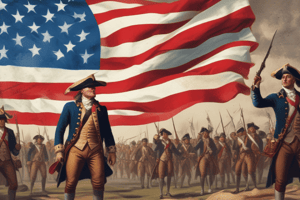Podcast
Questions and Answers
George Washington’s presidency was important because it set _______ for future presidents.
George Washington’s presidency was important because it set _______ for future presidents.
cabinets
In 1790, Americans felt _______ about the future of their new government.
In 1790, Americans felt _______ about the future of their new government.
hopeful
The group of selected advisors that helped Washington with issues in office is called the _______.
The group of selected advisors that helped Washington with issues in office is called the _______.
cabinet
Thomas Jefferson and other anti-Federalists were against Alexander Hamilton’s National Bank plan because it was _______.
Thomas Jefferson and other anti-Federalists were against Alexander Hamilton’s National Bank plan because it was _______.
Southern lawmakers consistently opposed protective tariffs between 1820 and 1850 because they felt like they were being _______.
Southern lawmakers consistently opposed protective tariffs between 1820 and 1850 because they felt like they were being _______.
President George Washington’s leadership during the Whiskey Rebellion (1794) was important because _______.
President George Washington’s leadership during the Whiskey Rebellion (1794) was important because _______.
Hamilton believed in a _______ interpretation of the Constitution, whereas Jefferson believed in a strict interpretation.
Hamilton believed in a _______ interpretation of the Constitution, whereas Jefferson believed in a strict interpretation.
In Washington’s farewell address, he encouraged Americans to _______.
In Washington’s farewell address, he encouraged Americans to _______.
In the XYZ affair, French agents wanted ______.
In the XYZ affair, French agents wanted ______.
The policy where the government should not interfere is called ______.
The policy where the government should not interfere is called ______.
The establishment of judicial review in Marbury v.Madison (1803) gave the Supreme Court the authority to ______.
The establishment of judicial review in Marbury v.Madison (1803) gave the Supreme Court the authority to ______.
The primary goal of United States foreign policy during the 1790s and early 1800s was to ______.
The primary goal of United States foreign policy during the 1790s and early 1800s was to ______.
The policy where sailors are taken off ships and forced to serve in a country’s armed forces is called ______.
The policy where sailors are taken off ships and forced to serve in a country’s armed forces is called ______.
Jefferson tried to peacefully force Britain and France to respect American neutrality by ______.
Jefferson tried to peacefully force Britain and France to respect American neutrality by ______.
Tecumseh organized his Confederation to ______.
Tecumseh organized his Confederation to ______.
Pride in one’s country is called ______.
Pride in one’s country is called ______.
Study Notes
Early American Government and Politics
- George Washington's presidency was important because it set a precedent for future cabinets.
American Views on Government
- In 1790, Americans felt uncertain about the future of their new government.
Washington's Leadership
- George Washington's leadership during the Whiskey Rebellion (1794) was important because it established the power of the federal government.
Jefferson and Hamilton's Interpretation of the Constitution
- Thomas Jefferson believed in a strict interpretation of the Constitution, while Alexander Hamilton believed in a loose interpretation.
Foreign Policy and Treaties
- Jay's Treaty led to tension between France and the United States during Adam's presidency.
- The primary goal of United States foreign policy during the 1790s and early 1800s was to remain neutral and avoid involvement in wars.
Political Parties
- In the early days of the United States, political parties were called Federalists and Anti-Federalists.
- Federalists centered on the formation of a strong centralized government, while Anti-Federalists believed most political power should be at the state level.
Economics and Banking
- Alexander Hamilton supported the creation of the Bank of the United States to help clear the national debt through taxes.
Election of 1796
- In the election of 1796, the Democratic-Republicans and Federalists supported Thomas Jefferson and John Adams, respectively.
The XYZ Affair and Foreign Relations
- In the XYZ Affair, French agents demanded money from the United States.
- The primary goal of United States foreign policy during the 1790s and early 1800s was to remain neutral and avoid involvement in wars.
The Supreme Court and Judicial Review
- The establishment of judicial review in Marbury v. Madison (1803) gave the Supreme Court the authority to decide whether laws passed by Congress were constitutional and to reject laws considered unconstitutional.
The Louisiana Territory and Exploration
- The purchase of the Louisiana Territory in 1803 was influenced by geographical considerations.
- Lewis and Clark's mission was completed successfully with the help of Sacajawea.
Impressment and Nationalism
- Impressment refers to the practice of taking sailors off ships and forcing them to serve in a country's armed forces.
- Nationalism is pride in one's country.
War of 1812 and Native American Relations
- Tecumseh organized his Confederation to stop white expansion in the Northwestern territory.
Studying That Suits You
Use AI to generate personalized quizzes and flashcards to suit your learning preferences.
Description
Explore the early years of the United States government, including George Washington's presidency and the formation of the cabinet. Learn about the opinions of Americans on the future of their government and the opposition to Alexander Hamilton's National Bank plan.




